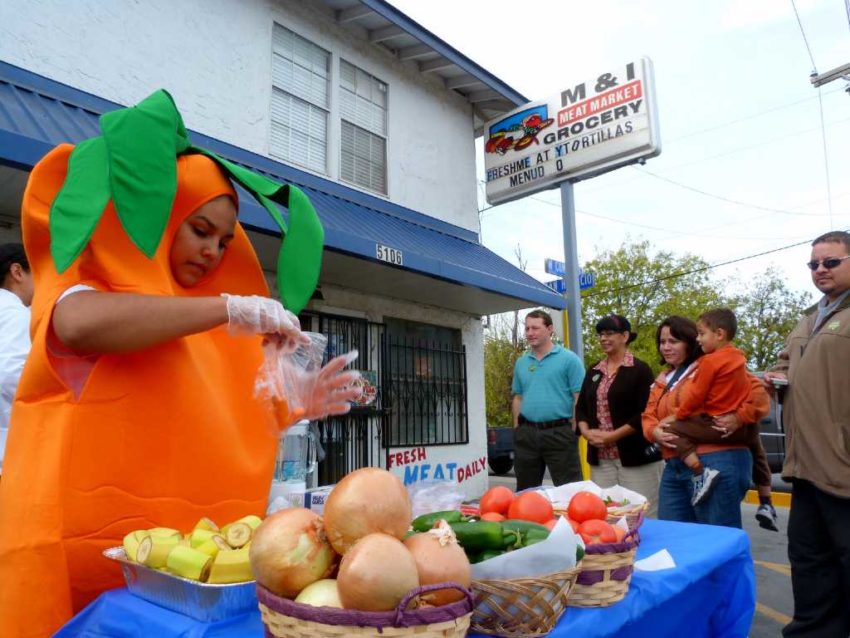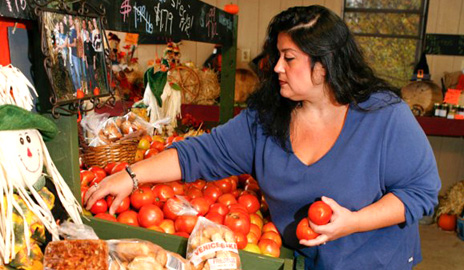
Share On Social!
“Tiendita por Vida” is Spanish for “little store for life.”
That’s exactly Irma Bajarro’s M&I Meat Market in the heart of San Antonio’s Westside is becoming.
The Westside of San Antonio is predominantly Latino, with many residents working low-income, long-hour jobs. Eating healthy is not easy here; fast-food joints and small corner stores, which tend to have fewer healthy items than full grocery stores, line the streets and give kids ample choices of sugary drinks and fried snacks, rather than fruits and vegetables.
Irma, who owns M&I, did not want to see another generation of diabetes growing up in her neighborhood.
Meat or Junk Food
Two years ago, if you walked into M&I, you’d have had two food options: meat or junk food.
Besides the long meat counter on the left side of the store, sodas, snack cakes, candy bars and bags of chicharrones greeted customers as they walked in. Irma, who owns the store, saw that obesity, especially childhood obesity, was a problem in the Latino community in San Antonio.
“A lot of the children weren’t getting the right fruits and produce that they were supposed to be eating,” Irma said.
Her store was not helping the community make healthy eating choices. But she knew it could.
In 2011, San Antonio Metropolitan Health District (Metro Health) researched corner stores that were in areas considered “food deserts” around the city. A food desert is an area with little or no access to large grocery stores that offer fresh and affordable foods needed to maintain a healthy diet.
M&I Meat Market was one of the stores selected and asked to voluntarily participate in a Healthy Kids Healthy Communities pilot program to get fruits and vegetables into corner stores in underserved areas.
“We were approached by the city about a year ago to see if we interested in bringing healthy selections to our neighborhood,” Irma said.
Irma saw a great need in her community and how her store could help meet that need. She filled out the lengthy application and was accepted as one of two pilot stores in the “Tiendita por Vida” program.
M&I Market would be given one cooler for fresh produce and one fridge for frozen produce to be placed at the front of the store for patrons to easily see and access. Irma and her husband would be responsible for keeping the fridge and cooler stocked with healthy options, a risky business move considering the higher price of fresh food versus prepackaged food and how quick fresh food spoils.
Promoting Healthier Options
At the start of the program, M&I Market held a kickoff event to showcase the healthier offerings to the neighborhood. The event featured healthy cooking demonstrations where a chef showed how patrons can use the fruits and vegetables sold at M&I to make healthy, delicious meals. Representatives from Metro Health were there to show support, along with people from the community.
The community responded well to the new options, Irma said. “Sweet potatoes…we brought them out and they were flying off the shelf.”
People loved buying fresh onions, jalapenos, eggplant and learning about new foods, too, like brussel sprouts. Irma says customers got a kick out of the brussel sprouts because they looked just like baby cabbages. In addition to the real food options, each fridge has a plastic card holder inside that holds tiny recipe cards provided by Metro Health; another way folks are encouraged to cook healthy meals for their families at home.
While the fresh fruits and vegetables were selling well, the frozen foods were not. This, Irma believes, is because Latinos in the neighborhood aren’t used to cooking with frozen vegetables. So she stopped stocking the frozen veggies and instead ordered even more fresh, non-frozen produce.

Throughout 2011 and 2012, M&I Meat Market continued to sell the fruits and vegetables to the Westside community with great success, restocking the fruits and veggies each month.
Irma saw the positive impact her store was having on the community. Even though she offered these new healthier options, she couldn’t help but notice ways her store could continue to improve. She still sold beer and cigarettes; she wondered what sort of message was that sending to kids who came in.
When the pilot program ended at the end of 2012, the city let Irma keep the coolers free of charge.
She made the choice to keep purchasing fruits and vegetables for her store. Even further, she decided remove all beer and cigarettes from her store. M&I was changing from an average corner store into a beacon of health for Latino families in the city’s Westside.
A Health Haven
With her own funds, Irma buys fruits and vegetables for her coolers, usually from the same people who provide her meat for the meat market portion of her store.
Irma continues to make notes about the healthy items that sell and the ones that don’t, hoping to always cater to her customers’ needs while maintaining the fresh produce.
She hopes that other small shops in the area will follow her lead and begin to offer healthier options. City officials, meanwhile, call Irma a success story and a perfect example of providing pilot incentive funding to corner stores to offer healthier options, which then become ingrained in store operations even after the pilot funding comes to an end.
By The Numbers
1
Supermarket
for every Latino neighborhood, compared to 3 for every non-Latino neighborhood
This success story was produced by Salud America! with support from the Robert Wood Johnson Foundation.
The stories are intended for educational and informative purposes. References to specific policymakers, individuals, schools, policies, or companies have been included solely to advance these purposes and do not constitute an endorsement, sponsorship, or recommendation. Stories are based on and told by real community members and are the opinions and views of the individuals whose stories are told. Organization and activities described were not supported by Salud America! or the Robert Wood Johnson Foundation and do not necessarily represent the views of Salud America! or the Robert Wood Johnson Foundation.



